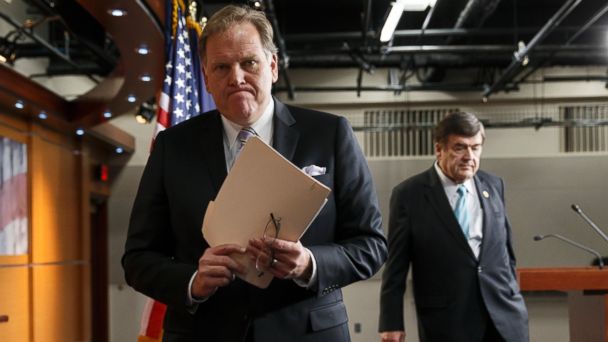Congress Coming Together to Overhaul Metadata Collection

(J. Scott Applewhite/AP Photo)
House Intelligence Committee Chairman Mike Rogers and Ranking Democrat Dutch Ruppersberger today introduced the FISA Transparency and Modernization Act of 2014. The bill also codifies a ban on the bulk collection of firearm sales records, library records, medical records, tax returns, educational records and other sensitive personal records.
"We think that we have found a way to end the government's bulk collection of telephone metadata and still provide a mechanism to protect the United States and track those terrorists who are calling into the United States to commit acts of terror," Rogers, R-Mich., said.
"This is a significant step, and important step. We think the White House is now moving toward our position on this. We've been sharing text with them for the last few weeks. We think this is an important step for them, for a bipartisan solution in moving forward so that we can get onto other important matters in the intelligence business."
Earlier today, President Obama detailed a series of proposals he hoped Congress would take to overhaul the administration's bulk metadata collection. The president's proposal requires the approval of Congress so, until it acts, the government will continue the program as it is.
The House bill would allow the government to collect only metadata it uses to safeguard the country against terrorists and other foreign bad actors "in a targeted, individualized way with robust judicial review."
Sen. Patrick Leahy, chairman of the Senate Judiciary Committee, welcomed Obama's decision to end the bulk collection of data, but added that the president could expedite the process by not seeking reauthorization for the program by Friday.
"I look forward to having meaningful consultation with the administration on these matters and reviewing its proposal to evaluate whether it sufficiently protects Americans' privacy," Leahy said in a statement. "In the meantime, the president could end bulk collection once and for all on Friday by not seeking reauthorization of this program. Rather than postponing action any longer, I hope he chooses this path."
Sen. Rand Paul, a chief critic of the data collection, criticized the House proposal for letting the NSA write its own subpoenas rather than a judge.
"The NSA are the police," Paul, R-Ky., told reporters at the Capitol today. "We separated the police from the judiciary with warrants. That was a very important step when we started our country. You can't let the police write warrants. The NSA should not write their own warrants. The NSA should seek a warrant, an independent judge has to approve it."
Rep. Adam Schiff, a member of the House Intelligence Committee, said that while Obama has "gone a long distance" there are other matters regarding the intelligence and national security communities that should be addressed.
"It's very important to have an adversarial process in the FISA court, so that the FISA court judges have the benefit of having conflicting views when they're asked to bless a new significant program, something that has constitutional import to it," Schiff, D-Calif., told ABC News. "The good news is there seems to be a convergence on viewpoints of what we should do on the telephone metadata program."
ABC News' Arlette Saenz and Jeff Zeleny contributed to this report.